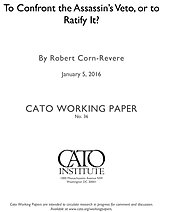This was yet another grim marker in the cross-cultural conflict illustrated by events such as the Ayatollah Khomeini’s 1989 fatwah against Salman Rushdie for writing The Satanic Verses, the 2004 murder of filmmaker Theo van Gogh on the streets of Amsterdam for perceived insults to Islam, and the violent reaction to the cartoons of Mohammad published in the Danish newspaper Jyllands-Posten in 2005. And this is just a partial list.
The phenomenon of killing or threatening to kill those who insult you or your way of life has come to be known as the assassin’s veto.
It is a darker and more sinister version of “the heckler’s veto,” which the law of free expression is designed in substantial part to prevent. As Professor Timothy Garton Ash described it, “[w]here the heckler’s veto says merely ‘I will shout you down,’ the assassin’s version is ‘dare to express that and we will kill you.’ ”
But where should the law come down on this? Should it defend free expression at all costs no matter how inflammatory the language or who is offended? Or should it permit the state’s coercive power to silence those who trade in insult or invective?

